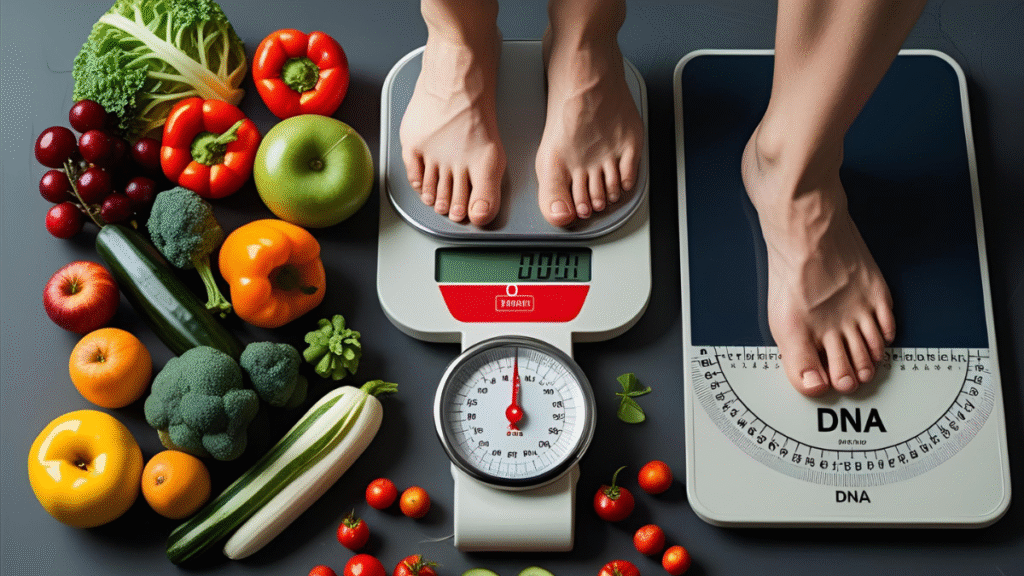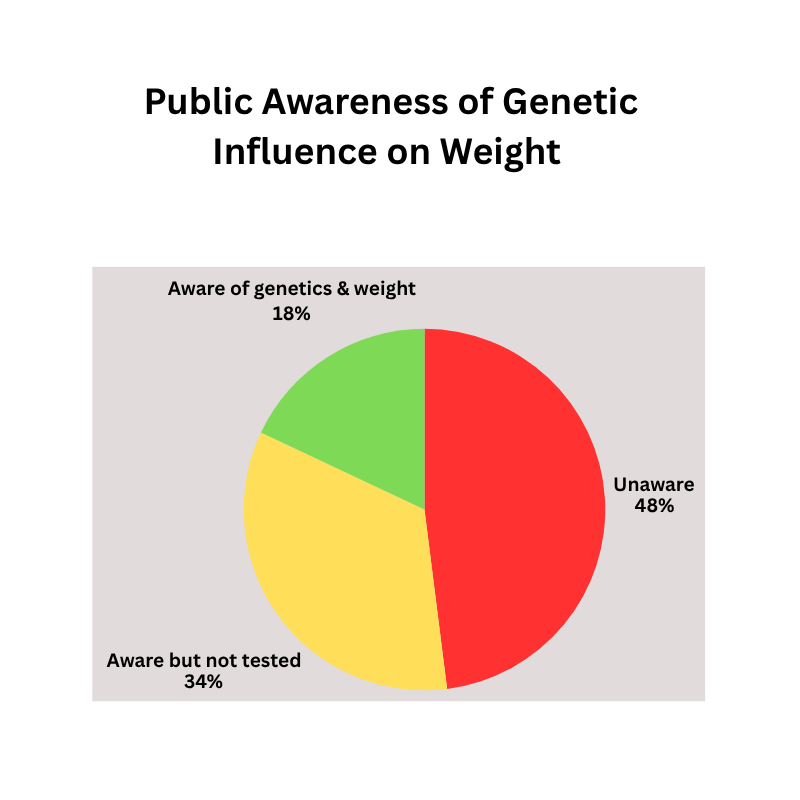
Introduction
Many people can’t lose weight despite trying everything — but the hidden culprit could be the FTO gene. Known as the fat gene or obesity gene, it may increase fat storage and block your efforts toward weight loss. If you carry this FTO gene, your body might resist fat-burning more than others. Understanding how the FTO gene and obesity are linked could be the first step to finally reaching your goals.
Nutrigenomics is a branch of science that studies how your DNA interacts with nutrients. It helps us understand why one diet might work for your friend but not for you. By identifying genetic variants, you can tailor your nutrition to suit your genetic profile for better health and weight management.
Fun Fact: Did you know? Some people can eat more carbs without gaining weight simply because of how their genes metabolize glucose.
In this blog, we’ll explore what the FTO gene does, how it affects your daily life, and how personalized nutrition based on your genetic profile can help you live healthier—without letting your genes decide your fate.
⚖️📈 What is the FTO Gene?
The FTO (Fat Mass and Obesity-Associated) gene is one of the first genes linked to obesity. People who carry certain variants of this gene are more likely to:
- Have a higher body mass index (BMI)
- Feel hungrier more often
- Prefer high-fat, high-calorie foods
- Struggle with weight management
Scientific Insight
A landmark study published in Nature Genetics found that people having two copies of a high-risk FTO variant were 70% more likely to become obese than those without it.
Real Experience:
A UK-based survey found that 62% of individuals who struggled with weight had no idea their genetics were influencing their appetite and metabolism.
🧬How the FTO Gene Works
The FTO gene influences how your body reacts to food, exercise, and even hunger signals. If you carry the risk variant of the FTO gene, you may experience the following effects
| Daily Activity | Impact of FTO Gene Variant |
| Eating | Increased appetite, especially for high-calorie and fatty foods |
| Energy Use | Slower metabolism in some people (lower basal metabolic rate) |
| Cravings | Stronger cravings for sugar and unhealthy fats |
| Exercise | Requires more effort to maintain or lose weight, but still effective |
| Sleep & Mood | Poor sleep and stress may worsen FTO effects, leading to emotional eating |
🧠 Key Insight:
Even though your FTO gene may work against you in some ways.But if you follow a smart nutrition plan and regular physical activity.It can neutralize its impact.
Real-Life Stories
Case Study : The Athlete’s Advantage
John, a professional athlete, discovered he had a low-risk FTO variant. This explained his naturally lean physique and ability to maintain a healthy weight despite consuming a high-calorie diet. Understanding his genetic makeup helped him tailor his training and nutrition to maximize performance.
⚖️The Future of FTO Gene Research
Scientists are exploring ways to “edit” or “silence” the FTO gene to combat obesity. While this technology is still in its infancy, it holds promise for future generations. Additionally, genetic testing is becoming more accessible, allowing individuals to take proactive steps based on their unique genetic makeup.
🏋️Why This Matters to You
Understanding the FTO gene isn’t just about weight—it’s about taking control of your health. Whether you’re predisposed to obesity or simply curious about your genetic blueprint, this knowledge empowers you to make informed decisions.
🍩FTO Gene Diet-Best Foods to Eat and Avoid
Instead of one-size-fits-all dieting, FTO carriers can benefit from personalized nutrition plans. Here’s how:
Diet Strategies for FTO Gene Carriers
1. Prioritize High-Protein Meals
Protein keeps you full longer and helps regulate ghrelin (the hunger hormone).
✅ Best choices: Lean meats, eggs, Greek yogurt, lentils, tofu, and whey protein (if you need a quick, filling snack).
💡 Pro Tip: A protein-rich breakfast (like scrambled eggs with avocado) can reduce cravings all day.
2. Choose Slow-Digesting Carbs
FTO carriers may process carbs differently, leading to quicker hunger spikes.
✅ Opt for: Sweet potatoes, quinoa, oats, and whole grains over refined carbs.
❌ Limit: White bread, sugary cereals, pastries.
3. Healthy Fats Are Your Friend
Fats help stabilize blood sugar and keep cravings in check.
✅ Best sources: Avocados, nuts, olive oil, fatty fish (salmon, sardines), and MCT oil (great for smoothies).
4. Fiber Is Non-Negotiable
Fiber slows digestion, keeping you fuller for longer.
✅ Load up on: Berries, broccoli, chia seeds, flaxseeds, and psyllium husk (an easy fiber boost).
5. Stay Hydrated (Sometimes Thirst Feels Like Hunger)
Dehydration can mimic hunger. Aim for 2-3L of water daily.
💡 Try: Infused water with lemon/cucumber or electrolyte drops if you’re active.
Lifestyle Tweaks That Make a Big Difference
1. Strength Training Over Cardio?
Studies suggest resistance training may be more effective for FTO carriers by improving insulin sensitivity and muscle metabolism.
2. Sleep Like Your Health Depends On It (Because It Does)
Poor sleep worsens hunger hormones. Aim for 7-9 hours nightly.
💡 Helpful: Magnesium glycinate or a sleep-support supplement if you struggle with rest.
3. Mindful Eating > Restrictive Dieting
Since the FTO gene increases cravings, strict diets often backfire. Instead:
✔ Eat slowly
✔ Stop at 80% full
✔ Avoid distractions (no phone during meals!)
🌱💊 Suggested Nutrigenomic Supplements
| Supplement | Benefit for FTO Carriers |
| Green Tea Extract | Enhances fat burning |
| Chromium | Reduces sugar cravings |
| Omega-3 Fatty Acids | Reduces inflammation and improves metabolism |
| Berberine | Control blood sugar and fat metabolism |
| Curcumin | Reduces inflammation and modulates obesity-related gene expression (including FTO). Use it Black pepper extract (piperine) for absorption. |
Case Study: Weight Loss Without Knowing the Cause
Maria, 34, from Spain
“I followed all the right diets, but I kept gaining weight. After a DNA test, I discovered I carried the FTO gene. My dietician adjusted my plan based on this, and I lost 12kg in 6 months!”
Survey Insight: A 2022 wellness survey showed that 48% of people who were not losing weight despite dieting had one or more fat metabolism gene variants.

Conclusion: Your Genes Aren’t Destiny, but They Are a Map
Understanding genes like FTO empowers you to work with your body, not against it. With nutrigenomics, personalized nutrition, and the right supplements, weight loss becomes more effective and sustainable.
🔒Disclaimer:
The information provided in this article about the FTO gene and diet is for educational and informational purposes only. It is not intended as medical advice and should not be used as a substitute for professional diagnosis, treatment, or personalized nutrition guidance.
Call to Action: Curious about your fat metabolism genes? Take a DNA test today by using DNa kit and unlock a nutrition plan made just for you.
Stay Tune:Upcoming post
5 Shocking Ways Your Gut Microbiome Fights Obesity Genes Naturally”
FAQs
1. What is the FTO gene and why is it called the “fat gene”?
The FTO gene is linked to fat mass and obesity. People with certain variants of this gene are more likely to experience increased hunger, fat storage, and weight gain.
2. Can I really lose weight if I have the FTO gene?
Yes. Knowing your genetic makeup allows you to adjust your diet and lifestyle in a personalized way, making weight loss more achievable.
3. What is nutrigenomics in simple words?
Nutrigenomics is the study of how your genes affect the way your body responds to different foods and nutrients.
4. How do I know if I have the FTO gene?
You can take a DNA test from companies like 23andMe or SelfDecode to check if you carry FTO or other fat metabolism-related gene variants.
5. Are there specific supplements for people with the FTO gene?
Yes. Supplements like green tea extract, chromium, and omega-3 fatty acids may help manage appetite, inflammation, and metabolism for FTO carriers.
6. Do I need to see a doctor or dietician for a nutrigenomics plan?
While not mandatory, consulting with a nutrigenomics-trained professional can help create a safer and more effective personalized nutrition plan.
References
- Frayling, T. M., et al. (2007). A common variant in the FTO gene is associated with BMI and obesity. Science, 316(5826), 889-894. https://doi.org/10.1126/science.1141634
- Loos, R. J. F., & Yeo, G. S. H. (2014). The bigger picture of FTO: the first GWAS-identified obesity gene. Nat Rev Endocrinol, 10(1), 51–61. https://doi.org/10.1038/nrendo.2013.227
- Dina, C., et al. (2007). Variation in FTO contributes to childhood and adult obesity. Nat Genet, 39(6), 724-726. https://doi.org/10.1038/ng2048
- SelfDecode. (n.d.). FTO Gene: Fat Mass and Obesity-Associated Gene. Retrieved from https://selfdecode.com
- British Nutrition Foundation. (2022). Obesity and Genetics: What does the science say? Retrieved from https://www.nutrition.org.uk
- Church, C., et al. (2010). Overexpression of FTO leads to obesity. Nat Genet, 42(12), 1086–1092. https://doi.org/10.1038/ng.713
Leave a Reply